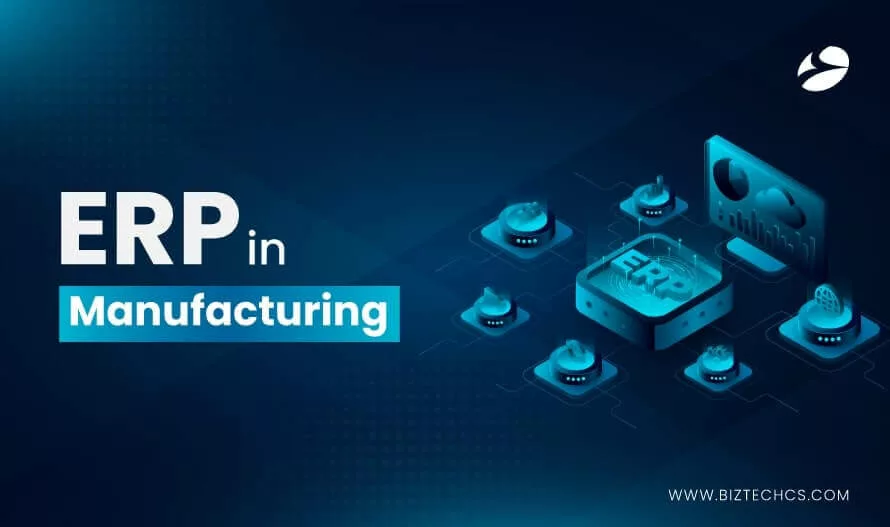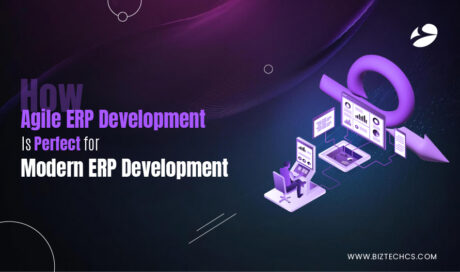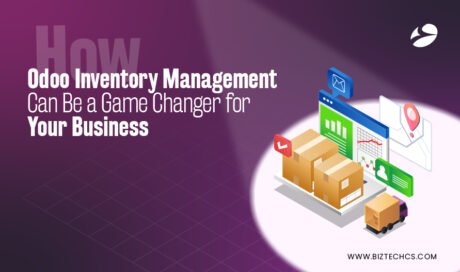2046
Transforming Manufacturing Landscape: What are the Benefits of ERP in Manufacturing?
27 Jul, 2023
7 min read
2046
27 Jul, 2023
7 min read
Table of Content:

In an industry like Manufacturing, the key pillars of success are efficiency and quality development. If your end product is high-quality and can attract the right audience, you are in for a win! But, at the same time, you need to keep your costs to a minimum, stay competitive, and generate higher revenue.
This is where Enterprise Resource Planning (ERP) software comes into play. With the implementation of ERP in Manufacturing, you get a comprehensive suite of tools to manage and optimize your business processes.
Thereby, achieving higher levels of productivity and operational efficiency. Another key benefit of ERP software in the manufacturing industry is its ability to provide real-time visibility into all aspects of the business.
With real-time data on inventory levels, production schedules, and customer demand, manufacturers like you can make informed decisions and quickly adapt to market dynamics. It helps you meet customer expectations in terms of delivery times and product quality.
By availing of ERP services, you can even automate your core business functions and ultimately drive operational excellence.
In this blog post, we will dig deeper into the benefits of ERP in manufacturing, future trends, and more to take your business to the next level.
Enterprise Resource Planning (ERP) is a software solution designed to streamline and integrate various business processes within an organization.
It provides a comprehensive view of a manufacturing company’s core business functions, such as
With ERP in manufacturing industry, you will get a centralized platform and will be able to automate your business processes.
ERP software solutions also provide real-time information on raw materials, product status, and customer demand, allowing manufacturing businesses to optimize their production processes and improve overall operational efficiency.
Additionally, ERP systems facilitate better communication and collaboration across departments and enable complete control over the manufacturing process, leading to improved product quality and customer service.
Thus, ERP plays a crucial role in transforming the manufacturing landscape by providing a centralized platform for managing and controlling manufacturing operations.
The manufacturing landscape is undergoing significant transformation due to technological advancements and globalization. As businesses operate in an increasingly interconnected world, the global supply chain has become more complex, requiring manufacturers to effectively manage their operations across various locations.
One of the critical aspects of this transformation is the shift toward demand forecasting and supply planning. With customer demands becoming more volatile and unpredictable, manufacturers need to accurately estimate future demand to optimize inventory levels and streamline production processes accordingly.
It helps businesses avoid problems like overstocking or stockouts; thereby ultimately improving customer satisfaction and reducing costs.
Manufacturing companies also face other challenges with managing assets, accounting and costing, production scheduling, and maintenance. But, implementing the right ERP modules for the manufacturing industry can address these issues by providing real-time data and visibility into core business functions.
By adopting ERP in manufacturing, businesses can make informed decisions, streamline production processes, optimize the supply chain, and improve operational efficiency. Let’s look into the various benefits of using ERP for your manufacturing business in detail.
Read More: Ecommerce ERP Integration
ERP systems provide manufacturing businesses with a wide range of benefits that positively impact their operations, processes, and overall growth. Let’s look at some of the notable benefits.
Which real-time insights can you get with the help of an ERP?
I. customer demand,
III. product status, and
III. overall production processes. With real-time data, manufacturers can effectively respond to customer needs, adapt to changing market demands, and optimize production resources.
By harnessing real-time information and transforming it into business intelligence, the manufacturing industry can drive operational efficiency, improve quality management, and enhance customer services. ERP systems truly revolutionize the manufacturing landscape by enabling timely and informed decisions for achieving business success.
These help you make accurate demand forecasts, plan production schedules, and ensure timely delivery of finished goods to customers. This leads to improved customer satisfaction, increased operational efficiency, and reduced lead times.
I. Real-time access to data: By integrating various business functions into a single platform, ERP provides manufacturing businesses with up-to-date, accurate information about their production processes, raw material availability, inventory levels, and customer demands.
II. Comprehensive analysis: By consolidating data from different departments and systems, ERP enables manufacturing businesses to examine information holistically. This means that businesses can track production timelines, monitor inventory levels, and analyze sales trends in one place, identifying bottlenecks, optimizing processes, and aligning production with customer demands.
III. Customer Relationship Management (CRM): With a complete ERP suite, you can also utilize the tools to optimize customer interactions and foster stronger relationships. By integrating customer data with the manufacturing process, businesses can improve order processing, provide accurate delivery times, and enhance customer satisfaction.
I. ERP systems track and monitor quality control at every stage of the manufacturing process. They enable the creation of comprehensive inspection plans that outline the quality checks to be performed at various stages. For example, receiving raw materials, during production, and before shipping finished goods. These inspection plans help maintain consistency and standardization in quality checks.
II. ERP systems facilitate the collection of inspection results, allowing for real-time data on quality checks. If any non-conformance is detected, the ERP system flags it. Thereby, ensuring prompt attention to rectify the issue. This capability helps to quickly identify and address any production or quality issues, minimizing the risk of defective products reaching customers.
III. ERP systems enable the creation of a master production schedule, which ensures effective planning and coordination of personnel, equipment, and materials required for production. By executing sales orders and calculating material requirements, ERP systems optimize inventory management and minimize the risk of stockouts or excess inventory.
I. Streamline HR processes and improve overall productivity.
II. Manage employee data with a centralized system.
III. Store and track employee information, such as personal details, qualifications, and performance records, in a single database. It not only ensures easy access to real-time data but also eliminates the need for manual record-keeping, saving time and reducing the risk of errors.
IV. Optimize workforce schedules. With features like shift planning, time and attendance tracking, and resource allocation, you can efficiently allocate staff resources, ensuring optimal productivity and reduced labor costs.
V. Track employee skills and competencies and suggest training and development programs. By identifying skill gaps and automatically generating training programs, these systems assist in improving employee capabilities and enhancing the overall performance of your organization.
VI. You can ensure compliance by automating processes like payroll management, tax reporting, and employee benefits administration, eliminating the risk of non-compliance and associated penalties.
With ERP in manufacturing, businesses can effectively manage their supply chain, ensuring timely delivery of raw materials and reducing inventory costs. By providing real-time visibility into production processes, businesses can make informed decisions and effectively respond to customer demand. Automation also enables advanced quality checks, ensuring product quality and customer satisfaction.
Furthermore, ERP solution manufacturers automate routine and repetitive tasks, freeing up resources to focus on more strategic activities. By centralizing data and streamlining workflows, manufacturers gain complete control over their business operations, resulting in improved efficiency and reduced costs.
There are numerous case studies and success stories that demonstrate the benefits of ERP implementation in the manufacturing industry.
After much research, they came to the conclusion that Odoo ERP is the best one for their organization. With Odoo ERP implementation, they were able to automate workflows to reduce errors and manage projects efficiently in real-time.
With Odoo, they didn’t just create an eCommerce website but also transformed their legacy system data and processes as per modern-day needs.
Want to elevate your manufacturing business processes too and take them to the next level? Connect with our expert ERP consultants and choose the best ERP for your business.
There are plenty of benefits of Open-ERP systems known to us. But, that doesn’t mean there are no limitations that we should watch out for.
Let’s take a look at things that make the ERP implementation process a complex and daunting task for manufacturing companies.
I. Customization: ERP systems need to be tailored to meet your unique requirements. You have to consider factors such as the type of manufacturing process, supply chain management, and inventory management. This customization adds complexity, increases implementation time, and raises upfront costs.
II. Data Migration: Manufacturing companies often have vast amounts of data stored in different formats and systems. Migrating this data to the new ERP system can be time-consuming and prone to errors. It requires careful planning and execution to ensure a smooth transition and minimize disruptions to ongoing operations.
III. Employee Resistance: Your employees are habituated to a certain setup and may resist change, fearing that new technology may replace their roles or disrupt familiar work processes. Overcoming this resistance requires effective change management strategies, including clear communication, training programs, and involving employees in the implementation process.
IV. Underutilization of ERP: Training plays a crucial role in ERP implementation. Manufacturing companies must invest in training programs to ensure employees have the necessary skills to operate the new system effectively. Lack of training can lead to underutilization of the ERP system’s features and functionalities.
In conclusion, implementing ERP systems in the manufacturing industry brings significant challenges. Customization, data migration, employee resistance, and training requirements are common obstacles that manufacturing companies must overcome to successfully implement an ERP system.
However, with proper planning, effective change management strategies, and adequate training, these challenges can be mitigated, enabling manufacturing companies to fully leverage the benefits of ERP systems.
The manufacturing landscape is undergoing a significant transformation, driven by future trends and innovations that are reshaping the way businesses operate. As new technologies emerge, manufacturers need to embrace advancements and remain competitive to ensure long-term success.
Here are some future trends that are likely to shape the future of ERP in manufacturing alongside the best ERP systems for manufacturing.

Development
Ecommerce
120
By Biztech
25 Jul, 2024

Development
ERP
170
By Devik Gondaliya
22 Jul, 2024

Ecommerce
ERP
Odoo
174
By Biztech
18 Jul, 2024